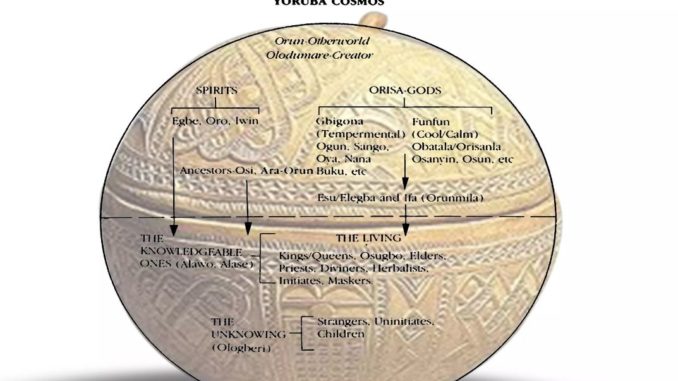
‘As above, so below‘ is a popular phrase in metaphysics.
In Yorùbá, igbá aiyé (world’s calabash, symbolic of the cylindrical shape of our globe) – see diagram above – represented by the circle as a symbol of universality. Igbá aiyé suggests that the Yorùbá worldview comprehends a spherical globe long before the Galileos and Copernicuses of this world refuted the early position of Christendom, that the world was flat.
The upper half of igbá aiyé represents the ‘other’ world (above) known as ‘Ọ̀run’ (some call it heaven), and the lower half represents our material world known as ‘aiyé‘ (below). The principle of duality, the binary, suggests that the one needs a complementary one to create an identity. The combining of the forces of ‘Ọ̀run‘ with aiyé helps us to decode the mysteries hidden from time and space.
The repository of universal knowledge is embedded in the African Information Retrieval System, a universal database commonly known as Ifá in Yorùbá. This is similar to what is known in Sanskrit (the Indian language) as the Akasha. In science, we talk of the electromagnetic spectrum, which is the realm of the interaction of the vibrations in space (electricity) and the vibratory energy emitted by earth (magnetism). As we know, this spectrum is so vast that depicts energies beyond human perception.
The dual nature of energy in everything that exists is the crux in unravelling what is not so apparent in our world. Gbogbo ohun t’ó ṣókùnkùn, Ifá ni o bá wa yo ju si gbangba. (All hidden phenomena, Ifá will expose them). From the foregoing, it is evident that the Yoruba recognises that forces unseen is required to solve most of the mysteries confronting humanity.
Our progenitors have demonstrated with their knowledge of binary coding that scientific solutions can be provided to solve the riddles in our universe.
TRUTH
In Ọ̀sá Aláwo (Ọ̀sá-Òtúrá) a chapter in one of the 256 corpuses (Odù) of Ifa, the question ‘what is truth?’ is posed. Ifá ní kíní njẹ́ òtítọ́, mo ní kíní njẹ́ òtítọ́? (Ifá asks what is truth, I also ask what is truth?) The verse in that chapter refers to nine features of Truth as an embodiment of Consciousness.
First, Òtítọ́ ni Olúwo ọ̀run tí ndáàbobo ilé aiyé – Truth is the divine superintendent which protects our universe. This is the Divine Intelligence which regulates the system of law and order in our Universe.
Second, Òtítọ́ ni Ẹ̀mí àìrí tí ndáàbobo ilé aiyé – Truth is the Unseen Force which protects our Universe. The vibratory energy in the atmosphere. (*The first and second tie into each other – one is akin to the Divine Overlord, the other is Energy).
Third, Òtítọ́ ni Ìwà Olódùmarè – Truth is Divine character. Yorùbá spirituality emphasises Ìwà (character) and Ọmọlúàbí (dignified conduct), which can only be attributed to an individual who has curtailed his/her passions sufficiently. This is the character of Divine Beings.
Fourth, Òtítọ́ ni Ọgbọ́n tí Olódùmarè nlò – Truth is the application of Divine Wisdom by Cosmic Intelligence, some may prefer to call it God.
Fifth, Òtítọ́ ni Ọ̀rọ̀ tí kìí yẹ̀ – Truth constitutes the immutable pronouncements which cannot falter. The Divine sources of knowledge are not whimsical. They are predicated on the laws of Nature.
Sixth, Ifá ni òtítọ́ – Ifá is truth. The compendium which accurately provides information on all that is.
Seventh, Òtítọ́ ni Ọ̀rọ̀ tí kìí bàjẹ̀ – Truth is the Divine Word which cannot be corrupted. If Ifá is truth, it means its Words cannot be corrupted. Unless a diviner embarks on mischief, Ifá‘s pronouncements are sacrosanct.
Eighth, Òtítọ́ ni Agbára t’ó ju gbogbo agbára lọ – Truth is the power above all powers. The power embedded in Universal Consciousness; it cannot be diminished or subordinate to any other source.
Lastly, Ọ̀sá Aláwo declares Truth as Ire Aiyérayé – blessings which subsists eternally. This suggests that Truth helps an individual to be perpetually blessed.
What the stanza in Ọ̀sá Aláwo is alluding to is that it is through the application of Ifá, as the database of divine knowledge, that truth in our world can be upheld. So Ifá is the compendium which contains universal truth. It is akin to the Sanskrit ‘Akasha’, which is the repository of knowledge which is not bound by time and space.


Be the first to comment